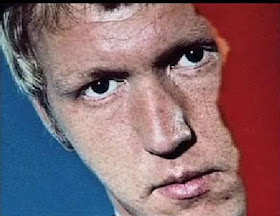Documentarian John Scheinfeld must love the work -- the voice, music and lyrics -- of the late Harry Nilsson, for his documentary WHO IS HARRY NILSSON (AND WHY IS EVERYBODY TALKIN' ABOUT HIM?) is about as full of love for a subject as a documentary can be, while still trying, at least, to present a full, warts-'n-all portrait. Only Tamra Davis' The Radiant Child, the recent docu/hagiogrpahy of Jean-Michel Basquiat might be said to possess a higher love quotient. Though both docs suffer somewhat from this sense of idolization (Ms Davis was a friend of Basquiat; I don't know what, if any, Scheinfeld's relationship to Nilsson might have been), the writer/director of the singer/songwriter bio-doc has managed to make his subject pretty damned full-bodied -- sad and scary, as well as sweet and gifted -- within the nearly two-hour framework of his documentary.
One of the real treats of Scheinfeld's film is how well his visuals, from animation to split screen to grids, tend to mirror to quirky personality of Nilsson. The director's visual sense keeps his film hopping, even as we get the usual retinue of talking heads elaborating on what kind of guy this Harry fellow really was. Scheinfeld (pictured at left) has chosen his tale-tellers wisely, too. They range from family and friends to music publis-hers, record producers and a multitude of fellow artists -- including Micky Dolenz (it was The Monkees' inclusion of one of his song on their album that gave Harry his first big break) to Brian Wilson, Paul Williams and Jimmy Webb.
Via well-selected archival footage, we see the musician as a very young man right through to his early death at the age of 52. So many artists seem to come from adversity (why does so much great art seem to thrive on this?), and Nilsson was no exception. His father walked out on the family when the boy was very young and he and his mom had a hard-scrabble life for many years. One relative tells us that Harry actually robbed a store (of $17!) so the rent could be paid.
Regarding Nilsson's music -- which the film is full of -- it seems to me that this holds up remarkably well, even after several decades. It was always original. While it borrowed from the past, of course, it also offered much that seemed new and odd and buoyant. Then there was that voice: reedy and thin but capable of amazing variation and range. It might not have been your favorite -- but no one else's was anything like it. Nilsson aficionados may already know much that's shown here, but for the rest of us who knew the musician best from songs such as Everybody's Talkin' and Without You (both of which won Grammy Awards), the documentary will be full of surprise. (I either didn't know or had forgotten that Everybody's Talkin' was not written by Nilsson.)
The musician's love for the work of Randy Newman is highlighted, as is his love of the old standards (an album of which he recorded, perhaps at the wrong time in his career). As full of good things as the movie is, there are also very dark moments -- such as the club "comeback concert" of the Smothers Brothers, at which Nilsson and John Lennon were so drink and destructive that they ruined the show and had to be ejected from the club. (The two, who were great friends, are shown below.)
The documentary pretty much breaks into two equal halves: Nilsson's career on the ascent and then the descent. Dates are oddly missing from almost the entire project -- until Harry meets the girl who will soon become his second wife, Una (many fans it seems, do not even know about his first), in August of 1973. If this latter half of the film is less enjoyable than the initial section (downhill tends to be), it is still full of surprise, interest and humour (Eric Idle tells of how Robert Altman's looney idea to take the film's musicians with cast and crew to Malta during the filming of PopEye: "This was a terrible idea, because all the drugs in the middle east then went with them!")
Toward the end of Nilsson's life, while he was working on music for The Fisher King in England, his oldest son Zak asked to go with him, and then tells us that this was the first and last time in his life that he had spent this much time -- several full days and nights -- with his dad. At the musician's death even Mother Nature seemed to join in the sorrow/anger: the worst California earthquake in decades occurred, with the heavy-duty after-shocks felt even during the funeral service.
Who Is Harry Nilsson (and Why is Everybody Talkin' About Him?), from Lorber Films, is available this Tuesday on DVD for sale or rental. Bonus extras are full of additional interviews and deleted scenes.






No comments:
Post a Comment